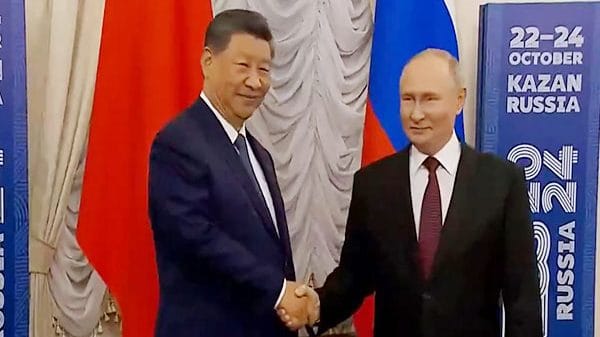The 16th BRICS Summit in Kazan, Russia, marks the debut of the five-nation grouping in its expanded format. On the invitation of Russian President Vladimir Putin, several non-Western countries are attending the summit, which Moscow has already declared a success against the Western narrative to isolate Russia and Putin over the war in Ukraine. China is also busy giving a positive spin to the BRICS-related development, spotlighting its potential as a global force for good and positioning itself as the voice of the so-called Global South.
Chinese discourse increasingly portrays BRICS as a key pillar in China’s vision for a multipolar world. Chinese media and strategic analysts emphasise BRICS not just as a bloc for economic cooperation, but also as a global new solution that can reshape the Western-dominated international order. In this narrative, China is at the helm, driving BRICS’ mission to foster development, stability, and resilience among Global South economies.
Li Yuanyuan, a Moscow correspondent for Guangming Daily, highlights how China, during its rotating presidency in 2022, championed an ‘open and inclusive’ BRICS that embraces development and expansion in the face of shifting global dynamics. According to Zhu Jiejin, a professor of international relations at Fudan University, ‘the expansion of BRICS signals the beginning of a new era for the group, with China assuming a central role in defining its future direction’.
Such arguments seek to portray China as the leader of global economic governance reform, while positioning BRICS as an alternative to the existing Bretton Woods institutions.
Also read: Distance matters in diplomacy—Modi’s Kazan visit for BRICS to open a new chapter with Russia
China’s increasing influence
Chinese scholars and commentators stress that BRICS’ evolution into BRICS 10 will reshape the global economic landscape. From their perspective, BRICS expansion is a triumph of China’s proposal of BRICS+ Cooperation model, as the grouping attracts more countries seeking to challenge the US-centric global order. Chinese discourse highlights the growing willingness of non-Western countries to join BRICS as a sign of their opposition to American dominance and a move toward a more inclusive international system.
Wei Qijia, a researcher at China’s National Information Center, describes BRICS as a grouping grounded in inclusivity and win-win cooperation. The expansion to BRICS 10, he argues, further solidifies China’s role as a leader among emerging economies.
Wang Lei, director of the BRICS Cooperation Research Center and professor at Beijing Normal University, stresses that in the face of global instability, BRICS cooperation has become more critical than ever. For China, BRICS is a platform that enhances its influence in global decision-making processes while aligning with Beijing’s broader goal of promoting a multipolar world.
Liang Guoyong, a senior economist at UNCTAD, described BRICS as a key global economic force, offering valuable insights for the ‘Global South’ through strengthened trade and technological collaboration. Liang also pointed out that BRICS is working to promote a more inclusive global economic system, with a focus on the digital economy and artificial intelligence.
Similarly, Jiang Tianjiao, deputy director of the BRICS Research Center at Fudan University, noted that the world is closely watching the 2024 summit’s outcomes amid rising geopolitical tensions. “With more members, a larger market, and a substantial population, BRICS will generate significant benefits and opportunities for trade and investment, raising expectations among all countries,” he emphasised.
Also read: BRICS summit has built a bigger club. But new members won’t be just bricks in the wall
China sees India as a disruptor
From the Chinese viewpoint, India’s involvement in BRICS is a complex and somewhat contradictory element. While India remains an important member, Chinese discourse often portrays India as a “negative force” within the group, obstructing its expansion at both BRICS and the Shanghai Cooperation Organisation (SCO) due to its growing alignment with the West.
Commentaries on Chinese platforms such as Baidu suggest that India’s resistance to certain initiatives within BRICS, such as the BRICS Pay and de-dollarisation, stems from a fear of losing influence. Jin Canrong, a professor at Renmin University, argues that while China dominates economically within BRICS and Russia wields political influence, India has struggled to find a clear leadership role. According to this perspective, India’s strategic autonomy and its efforts to balance relations with the US have complicated its position within the BRICS.
On Weibo, India is frequently portrayed as an obstacle to deeper cooperation within BRICS, with commentators likening India’s stance to “playing with fire.” Chinese analysts argue that India’s reluctance to fully commit to BRICS’ objectives leaves it isolated within the group. Nonetheless, Chinese commentators also highlight that India’s Prime Minister Narendra Modi’s participation in the Kazan summit hints at a potential thaw in relations with China with a possible Xi-Modi meeting, especially following the recent announcement of a patrolling agreement at the Line of Actual Control (LAC).
Also read: Payment systems, BRICS expansion & bilateral meets. What to expect as Modi heads to Russia
BRICS and global economic governance
Chinese discourse on BRICS underscores the grouping’s significance within Beijing’s broader strategy to reshape global economic governance. By framing BRICS as an inclusive and cooperative bloc, China aims to cement its leadership among emerging economies and challenge the prevailing dominance of the Western-led international order. As BRICS transitions into BRICS 10, China leverages this expansion to promote its vision of a multipolar world, while India’s cautious stance remains a focal point in Chinese strategic discussions.
A pivotal question emerges: As BRICS endeavours to redefine global economic governance, will it establish itself as a viable alternative to Western-led institutions, or will internal divisions impede its potential? The success of BRICS+ largely depends on China in this context. For China to effectively position BRICS as a formidable force in global governance, it must stop undermining India within the group. Achieving genuine inclusivity and accommodating the diverse interests of all members will be essential for fostering long-term effectiveness of the grouping.
Sana Hashmi is a fellow at Taiwan-Asia Exchange Foundation. She tweets @sanahashmi1. Views are personal.
(Edited by Prashant)






